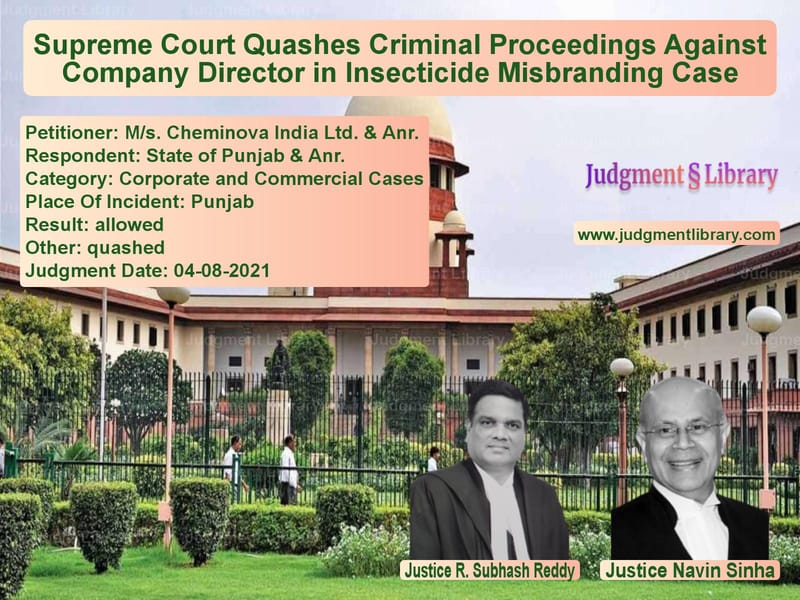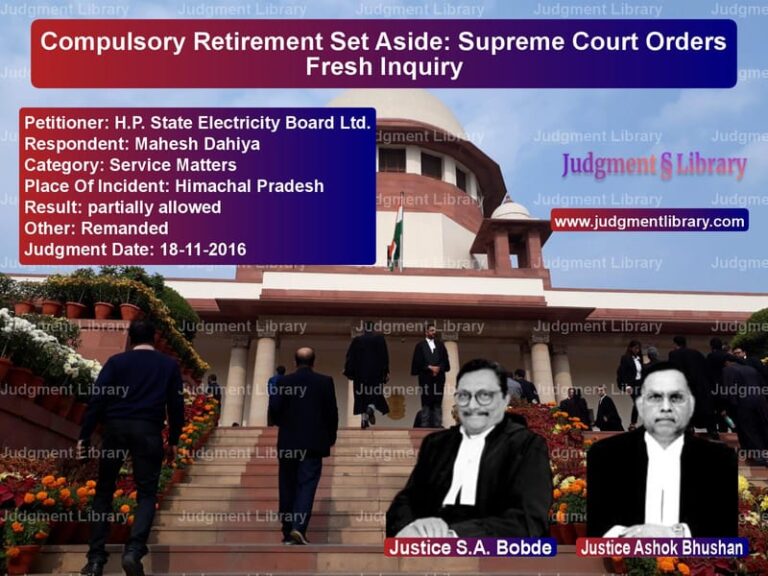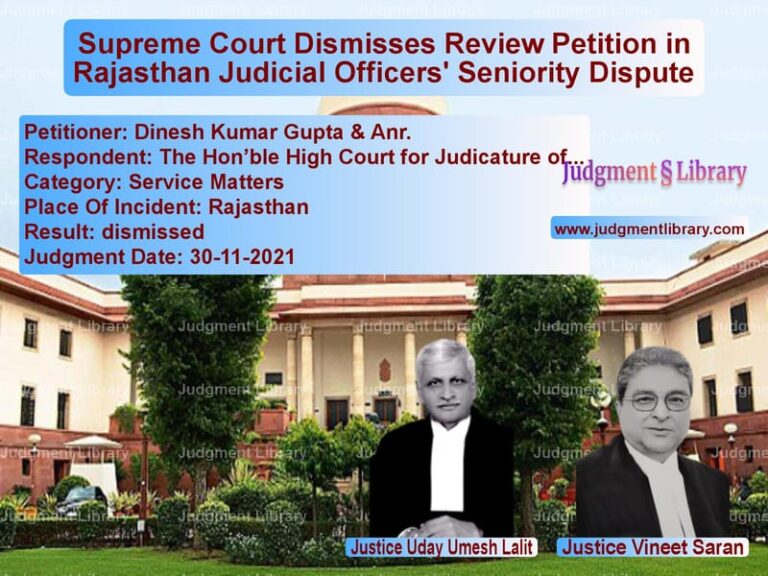Supreme Court Quashes Criminal Proceedings Against Company Director in Insecticide Misbranding Case
The case of M/s. Cheminova India Ltd. & Anr. v. State of Punjab & Anr. is a significant ruling concerning the prosecution of company directors for alleged misbranding of insecticides. The Supreme Court ruled that unless there are specific allegations of involvement, a company’s managing director cannot be held vicariously liable for offenses under the Insecticides Act, 1968.
Background of the Case
The case originated when the Insecticide Inspector of Attari, District Amritsar, filed a complaint against M/s. Cheminova India Ltd. (the appellant company) and its Managing Director under Sections 3(k)(i), 17, 18, and 33, punishable under Section 29 of the Insecticides Act, 1968, read with Rule 27(5) of the Insecticides Rules, 1971.
The complaint alleged that samples of Trizophos 40% E.C., an insecticide manufactured by Cheminova India Ltd., contained an active ingredient of only 34.70% instead of the declared 40%. The prosecution argued that this amounted to misbranding under Section 3(k)(i) of the Insecticides Act.
Key Issues Raised
- Whether the complaint was barred by limitation under Section 468 of the CrPC.
- Whether the company’s Managing Director could be held vicariously liable for the alleged offense.
- Whether the complaint failed to follow mandatory provisions under the Insecticides Act and CrPC.
Petitioner’s Arguments
The appellants, represented by their counsel, contended that:
- The complaint was time-barred as it was filed beyond the three-year limitation period prescribed under Section 468 of CrPC.
- The prosecution had violated Section 24 of the Insecticides Act by delaying the analysis of the insecticide samples.
- The Managing Director could not be held liable in the absence of specific allegations regarding his involvement in the alleged misbranding.
- The company had already designated a responsible officer for quality control, and thus, the Managing Director could not be prosecuted.
Respondent’s Defense
The State of Punjab argued that:
- The Insecticides Act mandates strict liability for misbranding.
- The Managing Director, as the company’s overall in-charge, was responsible for ensuring compliance with quality standards.
- The complaint was not time-barred as the limitation period should be computed from the date of receipt of the second analysis report.
Supreme Court’s Analysis and Ruling
The Supreme Court examined the provisions of the Insecticides Act and CrPC in detail and ruled as follows:
- The complaint was barred by limitation as it was filed beyond three years from the date of the first analysis report.
- The Managing Director could not be held liable in the absence of specific allegations linking him to the alleged offense.
- The complaint failed to follow the mandatory procedures outlined in the Insecticides Act, particularly regarding the timely testing of samples.
- The Magistrate had not followed the procedure prescribed under Section 202 of CrPC before taking cognizance.
Key Observations from the Judgment
The Supreme Court emphasized:
“Unless there are specific allegations against the Managing Director indicating his role in the alleged offense, he cannot be prosecuted merely because he is the head of the company.”
The Court further held:
“The complaint, being barred by limitation, cannot be allowed to proceed. Allowing such prosecution would amount to an abuse of the process of law.”
Final Judgment
The Supreme Court allowed the appeal and ruled that:
- The criminal proceedings against the Managing Director were quashed.
- The company could still be prosecuted if the allegations against it were substantiated.
- The lower court had erred in not considering the limitation period and the procedural lapses in the complaint.
Impact of the Judgment
This ruling reinforces the legal principle that corporate officials cannot be prosecuted merely due to their designation unless there are specific allegations against them. Key takeaways include:
- Company directors cannot be held vicariously liable unless there is clear evidence of their involvement in an offense.
- Limitation periods under CrPC must be strictly adhered to in criminal prosecutions.
- Prosecution under the Insecticides Act must comply with procedural safeguards, including timely testing of samples.
Conclusion
The Supreme Court’s decision in M/s. Cheminova India Ltd. & Anr. v. State of Punjab & Anr. establishes an important precedent in corporate liability cases. It ensures that company officials are not prosecuted arbitrarily and that criminal proceedings adhere to procedural requirements under the law.
Petitioner Name: M/s. Cheminova India Ltd. & Anr..Respondent Name: State of Punjab & Anr..Judgment By: Justice R. Subhash Reddy, Justice Navin Sinha.Place Of Incident: Punjab.Judgment Date: 04-08-2021.
Don’t miss out on the full details! Download the complete judgment in PDF format below and gain valuable insights instantly!
Download Judgment: ms.-cheminova-india-vs-state-of-punjab-&-an-supreme-court-of-india-judgment-dated-04-08-2021.pdf
Directly Download Judgment: Directly download this Judgment
See all petitions in Corporate Compliance
See all petitions in unfair trade practices
See all petitions in Judgment by R. Subhash Reddy
See all petitions in Judgment by Navin Sinha
See all petitions in allowed
See all petitions in Quashed
See all petitions in supreme court of India judgments August 2021
See all petitions in 2021 judgments
See all posts in Corporate and Commercial Cases Category
See all allowed petitions in Corporate and Commercial Cases Category
See all Dismissed petitions in Corporate and Commercial Cases Category
See all partially allowed petitions in Corporate and Commercial Cases Category







